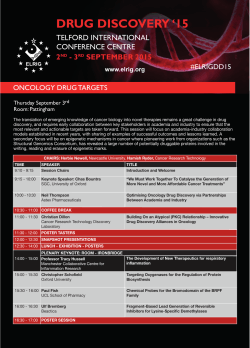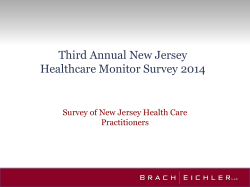
Cancer Survivorship: What, When, How?
CANCER SURVIVORSHIP: WHAT, WHEN, HOW? JIMMIE WELLS, MSN, RN, OCN ONCOLOGY SURVIVORSHIP NAVIGATOR ST. DOMINIC HOSPITAL OBJECTIVES Discuss cancer survivorship and it’s intended goals Review identified focus and national accreditation goals for survivorship care planning (SCP) Discuss when SCP should be initiated, disseminated and/or completed WHAT? CANCER SURVIVOR “an individual is considered a cancer survivor from the time of cancer diagnosis through the balance of his or her life.” (National Coalition for Cancer Survivorship and the NCI office of Cancer Survivorship) ACS CANCER SURVIVOR FACTS & FIGURES SURVIVORSHIP CARE Starts at diagnosis Optimize patient outcomes Reduce cost of care Support the overall physical and psychosocial well-being of survivor • • • • • Psychological Physical Social Spiritual Economic LIFE AFTER CANCER TREATMENT Transition Theory Ending Neutral Zone New Beginning Bridges, W. (2004). “Transitions: Making sense of Life Changes” ENDING Leaving the familiar • “Swimming out to sea” Physical recovery Unrealistic expectations Fatigue/depression Difficult to shed role of “patient” Rancour, P. (2008). Clinical Journal of Oncology Nursing NEUTRAL ZONE Characterized by sense of confusion, chaos and anxiety • “Treading water in the middle of the sea with no land in site” Lack of structure No longer have cancer but not “normal” either Rancour, P. (2008). Clinical Journal of Oncology Nursing NEW BEGINNING Ready to make a new beginning • Spotted land and began to swim with purpose Recognize opportunities May not be the same as before cancer diagnosis Time of exploration Review “meaning of life” Rancour, P. (2008). Clinical Journal of Oncology Nursing 2015 COC Standard 3.3 – Survivorship Care Plan • “The cancer committee develops and implements a process to disseminate a comprehensive care summary and follow-up plan to patients with cancer who are completing cancer treatment. The process is monitored, evaluated, and presented at least annually to the cancer committee and documented in minutes.” • American College of Surgeons – Commission on Cancer (CoC), 2015 STANDARD 3.3 (CLARIFICATION) Focused on the subset of survivors who are treated with curative intent, and have completed active therapy (other than long-term hormonal therapy). • Patients with metastatic disease are not targeted for SCP • • • • • 2015 – 10% of eligible patients 2016 – 25% of eligible patients 2017 – 50% of eligible patients 2018 – 75% of eligible patients 2019 – 100% of eligible patients SURVIVORSHIP Not just treatment summaries (Care Plans) Broad scope of services • • • • • • Symptom management Support groups Nutritional counseling Rehabilitation Education on late, long-term effects Surveillance WHEN? SCP DEVELOPMENT Delivery when “completed active therapy” • When to start?? • Where patients identified? Develop a SCP Process/work flow for your facility • Unique to your facility • Follow national guidelines • Start small CHOOSE A TEMPLATE Amount and type of information • Health literacy • Oncologist/PCP desired information • Prioritize ease of use Document format • Paper/electronic • Follow-up plan availability Creation • Who • Data retrieval/entry method TEMPLATES OPTIONS Homegrown • Requires up-front staff time investment • Manual and/or electronic ASCO • Free • Manual LiveStrong • Free • Manual Journey Froward • Free • Manual Commercial providers • Software acquisition cost • IT compatibility HOW? IDENTIFY DATA SOURCES Patient population/location targeted Required information Access Internal record keeping Medical record sources Cancer Registrar availability • Timeliness of registry reporting ASSIGNED STAFF RESPONSIBILITY Oncologist • Overview program • Review SCP RN Navigators Cancer registry Data entry personnel DELIVERY TIME FRAME Completion of “active therapy” • Timing important • Separate appointment vs along with existing appointment When • Patient preference • Patient readiness to engage • Schedule of follow-up appointments DELIVERY METHOD Face-to-face meeting • Preferred • Staff availability • Who delivers • RN • NP • MD Telephone Electronic media EVALUATION GOALS Gather feedback Monitor adherence to recommended screenings Develop measurable to evaluate effectiveness • Surveys • Survivors • PCP • Oncologist RESOURCES National Coalition for Cancer Survivorship www.canceradvocacy.org 1-877-622-7937 Survivorship A to Z www.survivorshipatoz.org/cancer Cancer Support Community www.cancersupportcommunity.org American Cancer Society www.cancer.org LiveStrong www.livestrong.org Journey Forward www.journeyforward.org REFERENCES Oncology Roundtable, Delivering Sustainable Survivorship Care, www.advisory.com “The Survivorship Challenge”, The Advisory Board Company, 2014 www.Advisory.com/or/survivorship.com American College of Surgeons: Commission on Cancer www.coc@facs.org
© Copyright 2025










